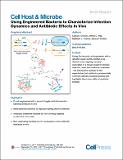Using Engineered Bacteria to Characterize Infection Dynamics and Antibiotic Effects In Vivo
Author(s)
Certain, Laura K.; Way, Jeffrey C.; Pezone, Matthew J.; Collins, James J.
Download1-s2.0-S1931312817303050-main.pdf (1.289Mb)
PUBLISHER_CC
Publisher with Creative Commons License
Creative Commons Attribution
Terms of use
Metadata
Show full item recordAbstract
Synthetic biology has focused on engineering microbes to synthesize useful products or to serve as living diagnostics and therapeutics. Here we utilize a host-derived Escherichia coli strain engineered with a genetic toggle switch as a research tool to examine in vivo replicative states in a mouse model of chronic infection, and to compare in vivo and in vitro bacterial behavior. In contrast to the effect of antibiotics in vitro, we find that the fraction of actively dividing bacteria remains relatively high throughout the course of a chronic infection in vivo and increases in response to antibiotics. Moreover, the presence of non-dividing bacteria in vivo does not necessarily lead to an antibiotic-tolerant infection, in contrast to expectations from in vitro experiments. These results demonstrate the utility of engineered bacteria for querying pathogen behavior in vivo, and the importance of validating in vitro studies of antibiotic effects with in vivo models. Using Escherichia coli engineered with a genetic toggle switch, Certain et al. demonstrate ongoing bacterial replication in a mouse model of chronic infection, even with antibiotic treatment. This finding runs contrary to the expectation that antibiotics preferentially eliminate actively dividing bacteria and highlights the in vivo utility of synthetic biology.
Date issued
2017-08Department
Institute for Medical Engineering and Science; Massachusetts Institute of Technology. Department of Biological EngineeringJournal
Cell Host & Microbe
Publisher
Elsevier BV
Citation
Certain, Laura K. et al. “Using Engineered Bacteria to Characterize Infection Dynamics and Antibiotic Effects In Vivo.” Cell Host & Microbe 22, 3 (September 2017): 263–268 © 2017 The Authors
Version: Final published version
ISSN
1931-3128